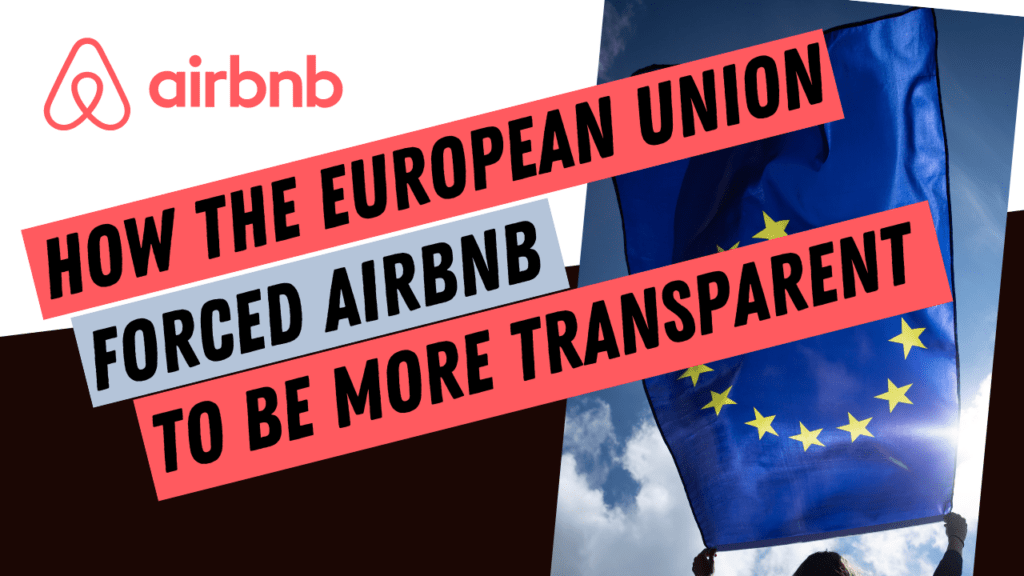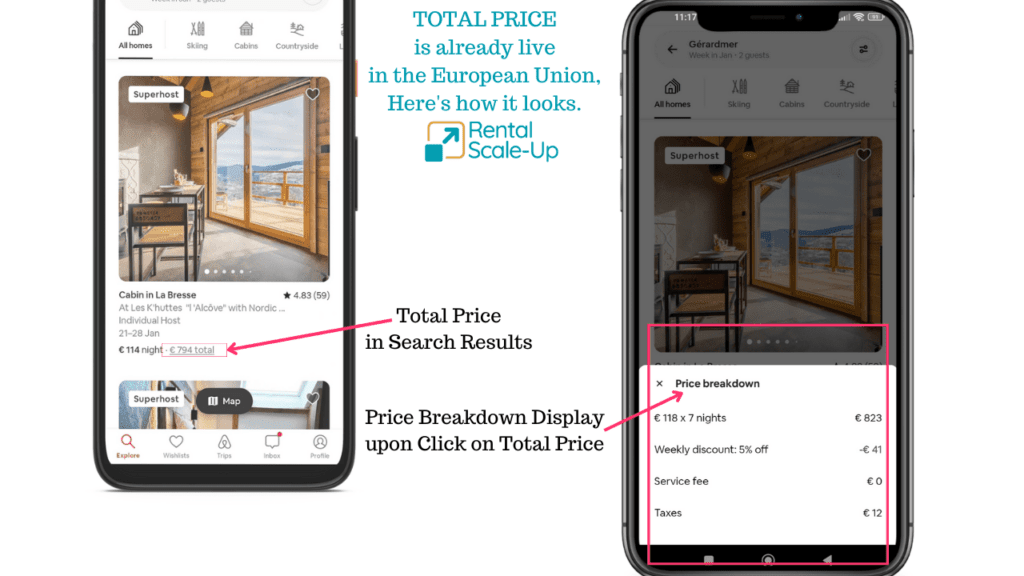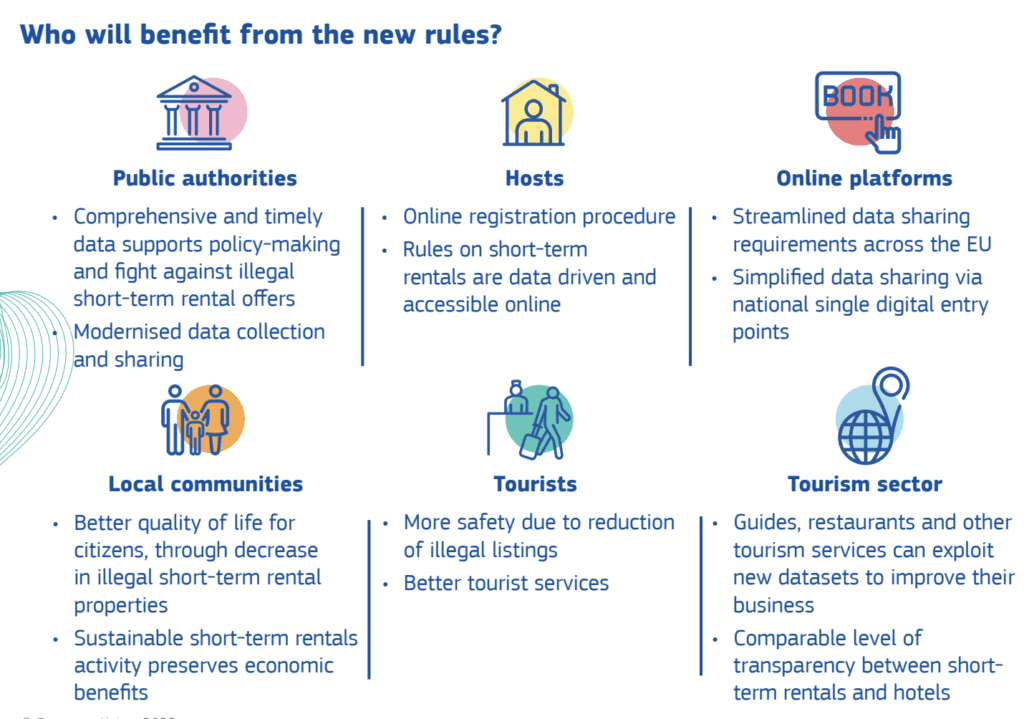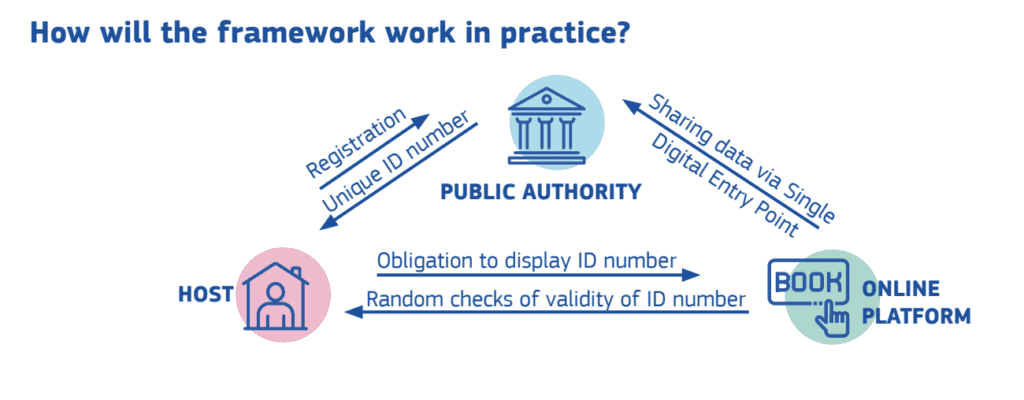In the US, social media pressure has made Airbnb implement big changes, from including “hidden fees” earlier in its total price display to getting CEO Brian Chesky to ask hosts to stop requiring guests to execute ridiculously long lists of chores at check-out time. However, in the European Union, the push for making Airbnb more transparent has been driven by strong European consumer and competition laws. For instance, while Airbnb will display “total stay prices” in the U.S. starting December 2022, the company has been forced to do so in the E.U. since 2019.
This article will detail even more differences between US and European Airbnb. For instance, all European listings must indicate whether a host is an “individual” or “professional.” These rules apply to all booking platforms operating in the E.U., such as Airbnb, Booking, and Vrbo. In terms of consumer rights, these laws usually go further than in the US.
Yet, it would be wrong to think that the E.U. is only working “against” online travel agents (OTAs). In some cases, it wants to act as an ally of small and big platforms by simplifying local regulations throughout the 27 E.U. countries. The goal is to make the E.U. an efficient common market with the same rules for consumers and platforms across the continent.
U.S. vs. E.U.: Key differences on the Airbnb platform
Let’s have a look at key differences stemming from agreements between the European Union and Airbnb.
Total Price Display (since 2019 in the E.U. vs. December 2022 in the U.S.)
Concern: Airbnb did not include all applicable extra charges, such as service and cleaning fees and local taxes, in the initial price quote given to consumers who search for a place to stay.
Explanation: Under EU consumer law, a price quote must include all fixed charges and taxes. If they can’t be calculated in advance, consumers must be clearly informed of the possibility that extra charges may apply.
Changes implemented by Airbnb in 2019: Airbnb now provides total price quotes which, from the outset, include all mandatory charges and fees (such as service and cleaning fees and local taxes).
Distinguish between Individual Hosts vs. Professionals Hosts as businesses should offer more consumer protections (since 2019)
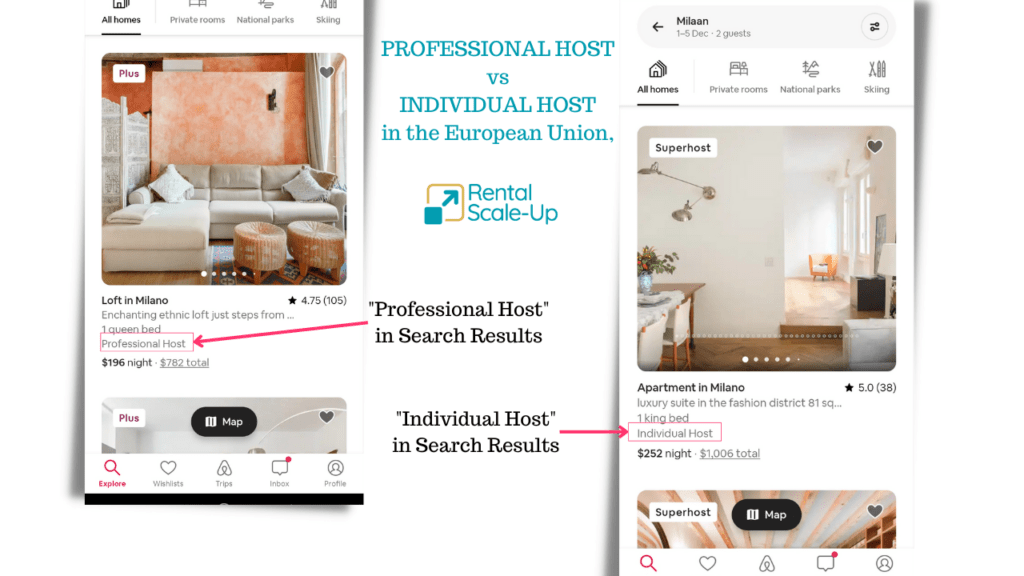
If you are a European host, you will see this question pop into your Airbnb hosting dashboard at some point: “Are you a private or a business host?”.
The EU Consumer Protection Cooperation regulations mandate that a host disclose whether they a “trader,” i.e., a business entity trying to make a profit, rather than an ordinary citizen selling something. In 2018, the EU stated, “Airbnb should clearly identify if the offer is made by a private host or a professional, as the consumer protection rules differ.”
For the E.U., businesses should offer more protections to consumers than individuals do.
In practice, at Rental Scale-Up, we have noticed little difference in how hosts are treated. Also, if you are a private property owner, it is sometimes unclear whether you should identify yourself as a private or a business host. It is also unclear whether guests consider this indication when picking a place.
Promotions and discounts need to be real, i.e., the lowest price in the last 30 days for the same listing (since 2022)
Airbnb CEO Brian Chesky has announced that hosts would be given new discounting tools in early 2023 as part of the Total Price Display and Hidden Fees update. According to E.U., discounts must be “real”, i.e., the new price must be lower than the lowest rate in the last 30 days. So, Airbnb’s new tool will have to enforce or recommend such consumer protections.
How would Airbnb’s new pricing and discounting tools look like and why would E.U. consumer laws impact them?
In 2020, Airbnb introduced discounting and merchandising tools for hosts. For instance, when a host used the Airbnb Custom Promotions tools to create a price discount between 10 and 14% off, their listing would get strike-through pricing in the search results and a new line item in the rate breakdown. The “new” and the “old” prices displayed should abide by E.U. regulations.
Since May 28, 2022, platforms such as Booking, Airbnb, and Vrbo must meet the requirements of the E.U.’s Omnibus Directive, part of the New Deal for EU Consumers Initiative. This Directive aims to modernize, supplement, and consolidate existing EU consumer laws.
For instance, how’s what Booking.com communicates to its hosts:
“When you offer a discount on a specific room/rate combination, the base rate of the exact same room/rate combination needs to be the lowest rate offered in the past 30 days. The base rate is the rate against which the discount will be applied – this will be shown as a strike-through price to customers on our platform. As of May 28, 2022, you’ll be required to make sure you meet the criteria set out above when you offer discounts on Booking.com.
E.U. regulation can also help short-term rental platforms operate across the Common Market (e.g., data-sharing, single host registry)
Just as in the U.S., European short-term regulations, caps, bans, and other restrictions vary from one city to another, from one state/country to another.
If you are a large platform like Airbnb and Booking.com, you may have enough money to pay lawyers across the E.U. to notice, understand, and implement each municipal / region / national rule. Yet, if you are a smaller company, it may just be too expensive or risky to operate across so many varying jurisdictions and regulations.
In October 2021, we covered the EU’s Short-Term Rental Initiative for the first time. The EU acknowledged that “across the EU, short-term rental market players are subject to a wide variety of regulatory and often burdensome requirements, often adopted at a local level, which can create market access barriers and make it more difficult to provide short-term rental services, in particular for small and medium enterprises”.
The European Commission wants to make things simpler for platforms, hosts, and local authorities with its new proposal for a regulation, proposed on November 2, 2022. , The goal is to “enhance transparency in the field of short-term accommodation rentals and help public authorities ensure their balanced development as part of a sustainable tourism sector.
The new proposed framework will:
Create a unique Host registry across the E.U.
The regulation will harmonize registration requirements for hosts and their short-term rental properties when introduced by national authorities: registration schemes will have to be fully online and user-friendly. A similar set of relevant information on the hosts and their properties, namely the “who”, “what” and “where”, should be required. When completing registration, hosts should receive a unique registration number.
Clarify rules to ensure registration numbers are displayed on short-term rental platforms
Online platforms will have to facilitate hosts to display registration numbers on their platforms. They will also have to check whether hosts register and display the correct numbers randomly. Public authorities will be able to suspend registration numbers and ask platforms to delist non-compliant hosts.
Streamline data sharing between online platforms and public authorities
Online platforms will have to share data about the number of rented nights and guests with public authorities once a month in an automated way. Lighter reporting possibilities are foreseen for small and micro platforms. Public authorities will be able to receive this data through national ‘single digital entry points. This will support well-targeted policymaking.
Allow the reuse of data in aggregate form:
The data generated under this proposal will, in aggregate form, contribute to tourism statistics produced by Eurostat and feed into the upcoming European data space for tourism. This information will support the development of innovative, tourism-related services.
Establish an effective framework of implementation:
Member States will monitor the implementation of this transparency framework and put in place the relevant penalties for non-compliance with the obligations of this Regulation.
So, three years after the European Union forced Airbnb to display a fully-loaded price when users are conducting a search on its platform, the same is happening in the U.S. Here, the change agent is social media, not a supra-national entity. Will some of the rules implemented in Europe by Airbnb and other vacation rental booking platforms also come to force in the U.S. at some point?

